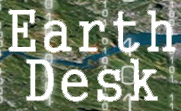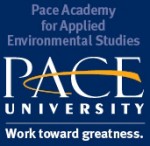About EarthDesk
 Pace Academy for Applied Environmental Studies created its EarthDesk blog in the belief that higher education has a duty to advance the global conversation about the relationship between human and nature. It offers a critical look at environmental issues, and the world beyond them, with special attention to the global water crisis, animal welfare, climate change and the relationship of environmentalism to society at-large.
Pace Academy for Applied Environmental Studies created its EarthDesk blog in the belief that higher education has a duty to advance the global conversation about the relationship between human and nature. It offers a critical look at environmental issues, and the world beyond them, with special attention to the global water crisis, animal welfare, climate change and the relationship of environmentalism to society at-large.
We convene thinkers and doers from the Pace University campuses, the greater New York region, and the world, from a host of disciplines – from law to art, business to the sciences, technology to human health, and more. Our objective is to advance creative thought and innovative solutions. We invite you to join the conversation.
John Cronin is managing editor for EarthDesk. Michelle D. Land and Andrew C. Revkin are its co-editors.
Disclaimer: The views and opinions expressed on EarthDesk are solely those of the original authors and other contributors. These views and opinions do not necessarily represent those of Pace University, its staff or any/all contributors to the EarthDesk blog. All comments are reviewed before posting and comments that include profanity or other inappropriate comments or material will not be posted.
About Pace Academy for Applied Environmental Studies
 Pace Academy was founded to advance a mutually enhancing relationship between nature and society through a university-wide program of interdisciplinary pedagogy, scholarship, policy development and service. It is a university center for excellence within the Office of the Provost in the tradition of Pace’s time-honored commitment to environmental research, scholarship, and service. Because the study of the environment is inherently interdisciplinary, Pace Academy engages expertise across departments within Pace’s schools and colleges.
Pace Academy was founded to advance a mutually enhancing relationship between nature and society through a university-wide program of interdisciplinary pedagogy, scholarship, policy development and service. It is a university center for excellence within the Office of the Provost in the tradition of Pace’s time-honored commitment to environmental research, scholarship, and service. Because the study of the environment is inherently interdisciplinary, Pace Academy engages expertise across departments within Pace’s schools and colleges.
 Pace Academy also serves as the headquarters of the Environmental Consortium of Colleges & Universities, established in 2004 to help facilitate our understanding of the cultural, social, political, economic, and natural factors affecting the region. The Environmental Consortium’s mission is to harness higher education’s intellectual and physical resources to advance regional, ecosystem-based environmental research, teaching, and learning with a special emphasis on the greater Hudson-Mohawk River watershed.
Pace Academy also serves as the headquarters of the Environmental Consortium of Colleges & Universities, established in 2004 to help facilitate our understanding of the cultural, social, political, economic, and natural factors affecting the region. The Environmental Consortium’s mission is to harness higher education’s intellectual and physical resources to advance regional, ecosystem-based environmental research, teaching, and learning with a special emphasis on the greater Hudson-Mohawk River watershed.









